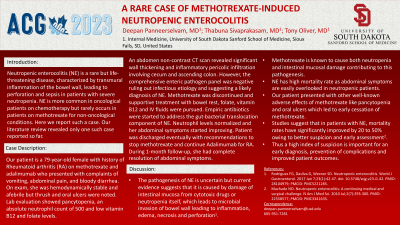Tuesday Poster Session
Category: Small Intestine
P4159 - A Rare Case of Methotrexate-Induced Neutropenic Enterocolitis
Tuesday, October 24, 2023
10:30 AM - 4:00 PM PT
Location: Exhibit Hall

Has Audio

Deepan Panneerselvam, MD
University of South Dakota Sanford School of Medicine
Sioux Falls, SD
Presenting Author(s)
Deepan Panneerselvam, MD, Thabuna Sivaprakasam, MD, Tony Oliver, MD
University of South Dakota Sanford School of Medicine, Sioux Falls, SD
Introduction: Neutropenic enterocolitis (NE) is a rare but life-threatening disease, characterized by transmural inflammation of the bowel wall, leading to perforation and sepsis in patients with severe neutropenia. NE is more common in oncological patients on chemotherapy but rarely occurs in patients on methotrexate for non-oncological conditions. Here we report such a case. Our literature review revealed only one such case reported so far.
Case Description/Methods: Our patient is a 79-year-old female with history of Rheumatoid arthritis (RA) on methotrexate and adalimumab who presented with complaints of vomiting, abdominal pain, and bloody diarrhea. On exam, she was hemodynamically stable and afebrile but thrush and oral ulcers were noted. Lab evaluation showed pancytopenia, an absolute neutrophil count of 500 and low vitamin B12 and folate levels. An abdomen non-contrast CT scan revealed significant wall thickening and inflammatory pericolic infiltration involving cecum and ascending colon. However, the comprehensive enteric pathogen panel was negative ruling out infectious etiology and suggesting a likely diagnosis of NE. Methotrexate was discontinued and supportive treatment with bowel rest, folate, vitamin B12 and IV fluids were pursued. Empiric antibiotics were started to address the gut-bacterial translocation component of NE. Neutrophil levels normalized and her abdominal symptoms started improving. Patient was discharged eventually with recommendations to stop methotrexate and continue Adalimumab for RA. During 1-month follow-up, she had complete resolution of abdominal symptoms.
Discussion: The pathogenesis of NE is uncertain but current evidence suggests that it is caused by damage of intestinal mucosa from cytotoxic drugs or neutropenia itself, which leads to microbial invasion of bowel wall leading to inflammation, edema, necrosis and perforation. Methotrexate is known to cause both neutropenia and intestinal mucosal damage contributing to this pathogenesis. NE has high mortality rate as abdominal symptoms are easily overlooked in neutropenic patients. Our patient presented with other well-known adverse effects of methotrexate like pancytopenia and oral ulcers which led to early cessation of methotrexate. Studies suggest that in patients with NE, mortality rates have significantly improved by 20 to 50% owing to better suspicion and early assessment. Thus a high index of suspicion is important for an early diagnosis, prevention of complications and improved patient outcomes.
Disclosures:
Deepan Panneerselvam, MD, Thabuna Sivaprakasam, MD, Tony Oliver, MD. P4159 - A Rare Case of Methotrexate-Induced Neutropenic Enterocolitis, ACG 2023 Annual Scientific Meeting Abstracts. Vancouver, BC, Canada: American College of Gastroenterology.
University of South Dakota Sanford School of Medicine, Sioux Falls, SD
Introduction: Neutropenic enterocolitis (NE) is a rare but life-threatening disease, characterized by transmural inflammation of the bowel wall, leading to perforation and sepsis in patients with severe neutropenia. NE is more common in oncological patients on chemotherapy but rarely occurs in patients on methotrexate for non-oncological conditions. Here we report such a case. Our literature review revealed only one such case reported so far.
Case Description/Methods: Our patient is a 79-year-old female with history of Rheumatoid arthritis (RA) on methotrexate and adalimumab who presented with complaints of vomiting, abdominal pain, and bloody diarrhea. On exam, she was hemodynamically stable and afebrile but thrush and oral ulcers were noted. Lab evaluation showed pancytopenia, an absolute neutrophil count of 500 and low vitamin B12 and folate levels. An abdomen non-contrast CT scan revealed significant wall thickening and inflammatory pericolic infiltration involving cecum and ascending colon. However, the comprehensive enteric pathogen panel was negative ruling out infectious etiology and suggesting a likely diagnosis of NE. Methotrexate was discontinued and supportive treatment with bowel rest, folate, vitamin B12 and IV fluids were pursued. Empiric antibiotics were started to address the gut-bacterial translocation component of NE. Neutrophil levels normalized and her abdominal symptoms started improving. Patient was discharged eventually with recommendations to stop methotrexate and continue Adalimumab for RA. During 1-month follow-up, she had complete resolution of abdominal symptoms.
Discussion: The pathogenesis of NE is uncertain but current evidence suggests that it is caused by damage of intestinal mucosa from cytotoxic drugs or neutropenia itself, which leads to microbial invasion of bowel wall leading to inflammation, edema, necrosis and perforation. Methotrexate is known to cause both neutropenia and intestinal mucosal damage contributing to this pathogenesis. NE has high mortality rate as abdominal symptoms are easily overlooked in neutropenic patients. Our patient presented with other well-known adverse effects of methotrexate like pancytopenia and oral ulcers which led to early cessation of methotrexate. Studies suggest that in patients with NE, mortality rates have significantly improved by 20 to 50% owing to better suspicion and early assessment. Thus a high index of suspicion is important for an early diagnosis, prevention of complications and improved patient outcomes.
Disclosures:
Deepan Panneerselvam indicated no relevant financial relationships.
Thabuna Sivaprakasam indicated no relevant financial relationships.
Tony Oliver indicated no relevant financial relationships.
Deepan Panneerselvam, MD, Thabuna Sivaprakasam, MD, Tony Oliver, MD. P4159 - A Rare Case of Methotrexate-Induced Neutropenic Enterocolitis, ACG 2023 Annual Scientific Meeting Abstracts. Vancouver, BC, Canada: American College of Gastroenterology.
